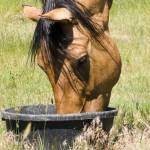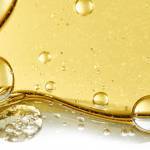Cobalt in Equine Diets

Because they are considered hindgut fermenters, horses rely on a bounty of bacteria and other microorganisms in the cecum and large colon to ferment fiber and produce volatile fatty acids. Those fatty acids, such as propionate, provide horses with the energy required for exercise, performance, and day-to-day metabolic activities. Therefore, keeping the intestinal microbiome healthy perpetuates the supply of volatile fatty acids for the horse. Cobalt, a micromineral that naturally occurs in various feed ingredients, helps achieve this goal.
“The cobalt found in feedstuffs actually isn’t for your horse itself but instead supports the fermenting microbes in the hindgut. Those microorganisms require cobalt to produce vitamin B12. In turn, vitamin B12 plays key roles in propionate production, various metabolic pathways, and the production of glucose by the liver,” explained Kathleen Crandell, Ph.D., a nutritionist for Kentucky Equine Research.
One recently published study* explored whether cobalt supplementation could enhance fiber digestion in horses, with the idea that maximizing energy extraction from fiber could decrease the need for adding concentrates to a horse diets to meet daily energy demands.
“While concentrates benefit many horses, such as those actively involved in heavy work, higher starch concentrates are contraindicated in other equids, particularly those with insulin resistance, equine metabolic syndrome, equine Cushing’s disease, and chronic laminitis,” Crandell said.
Laboratory exploration of this hypothesis failed to prove that supplemental cobalt increases digestibility and volatile fatty acid production.
Horse owners should also note that elevated levels of cobalt are prohibited in certain racing jurisdictions.
“Rather than looking for a quick and easy supplement that might minimize concentrate usage and maximize forage fermentation, owners should instead focus on offering quality forage and hindgut health. For optimizing hindgut microbial fermentation and pH, Kentucky Equine Research offers the hindgut buffer EquiShure,” Crandell advised.
*Fehlberg, L.K., J.M. Lattimer, J.S Drouillard, et al. 2019. Effect of cobalt chloride on fermentation of alfalfa and smooth bromegrass hays by horse cecal microorganisms. Journal of Equine Veterinary Science. 77:75-79.








